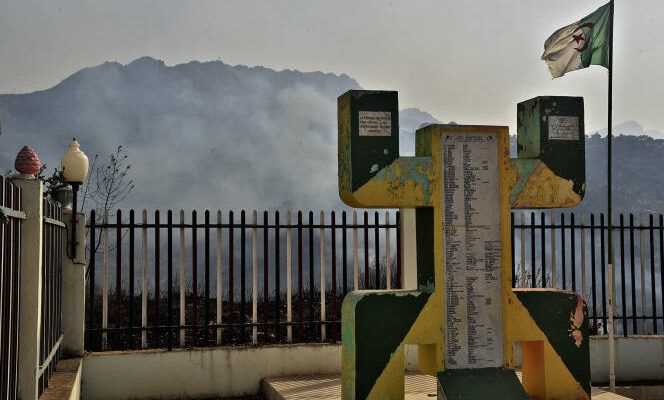This is a new escalation in the serious diplomatic crisis that opposes the two neighboring countries of the Maghreb: Wednesday August 18, Algeria decided to ” meet again “ its relations with Morocco, accused of being involved in the deadly fires that ravaged the north of the country. “The incessant hostile acts perpetrated by Morocco against Algeria have necessitated the revision of relations between the two countries and the intensification of security controls at the western borders”, said a statement from the Algerian presidency, without further clarification. Rabat had not reacted at the end of the evening.
This decision was taken during an extraordinary meeting of the Algerian High Security Council chaired by the Head of State, Abdelmadjid Tebboune, and devoted to the assessment of the situation after the gigantic forest fires which made at least 90 dead in the north of the country. According to President Tebboune, most of these fires were original “Criminal” – without the slightest proof being presented so far. The investigation made it possible to “Discover that a criminal network classified as a terrorist organization” is behind the fires, “By the admission of its arrested members”, according to the Directorate General of National Security (DGSN).
One man lynched, 61 suspects arrested
Beyond the human and material losses – and the shortcomings of the public authorities brought to light during these fires – Algerians were deeply shocked by the lynching and immolation of a man wrongly accused of pyromania in Kabylia, region Berber speaker from the northeast of the country ravaged by fires. Sixty-one suspects have been arrested since the murder of Djamel Bensmaïl on August 11. Algerian leaders accused the Movement for Self-Determination of Kabylia (MAK), an independentist organization, of being responsible for the fires and the ignominious death of the young man.
“The High Security Council has decided […] to step up the efforts of the security services for the arrest of the rest of the individuals involved in the two crimes, as well as all members of the two terrorist movements which threaten public security and national unity, until their total eradication, in particular the MAK, which receives support and assistance from foreign parties, led by Morocco and the Zionist entity [Israël] “, according to the Algerian presidency. Paris-based MAK, interviewed by AFP, rejected the allegations. Some of the suspects arrested confessed to belonging to this movement, according to confessions filmed and broadcast by Algerian television.
Algiers also questioned the Islamo-conservative Rachad movement, based in London. These two movements, bête noire of Algerian power, are illegal in Algeria, where they were classified as “terrorist organizations” on May 18. “Will we see a manhunt?” The Algerian League for the Defense of Human Rights [LADDH] calls for restraint, foresight and wisdom ”, its vice-president, Saïd Salhi, worried in a press release received by AFP.
Kabyle and Sahrawi independentists
This episode consecrates a further deterioration of the conflictual relations between Algiers and Rabat, whose common border has been officially closed since August 16, 1994. A month ago to the day, Algiers recalled its ambassador in Rabat to “Consultations with immediate effect”, following “The drift of the Moroccan diplomatic representation in New York, which distributed an official note to the member countries of the non-aligned movement in which Morocco” publicly and explicitly supports an alleged right to self-determination of the Kabyle people “”, explained the Algerian foreign ministry.
During a meeting of the non-aligned movement, on July 13 and 14 in New York, Morocco’s ambassador to the UN, Omar Hilale, passed a note in which he considered that “The valiant Kabyle people deserve, more than any other, to fully enjoy their right to self-determination”. A red line for Algiers, which opposes any desire for independence in Kabylia. The Moroccan diplomat had expressed his support for Kabyle separatism in reaction to the support given by Algiers to the Saharawi separatists of the Polisario Front, who are fighting against Morocco.
Traditionally difficult, relations between Algiers and Rabat have indeed experienced a recent deterioration due to the thorny issue of Western Sahara. The normalization of diplomatic relations between Morocco and Israel, in return for American recognition of the “Sovereignty” Moroccan in this territory, further heightened tensions with Algeria, which denounced “Foreign maneuvers” aimed at destabilizing it. For its part, Morocco considers Algeria as “A real stakeholder in the conflict” in Western Sahara.
